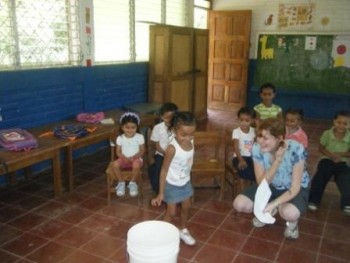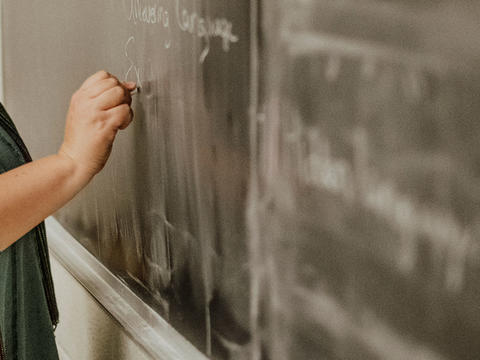Providing Health Education in Nicaragua

Maia Freudenberger '13 in Nicaragua.
Details
While presenting a health workshop in a Nicaraguan school, a volunteer American dentist mumbled in broken Spanish and chastised the children for not knowing how to properly brush their teeth. He brought no interactive skits or songs, and his posters were so tiny the kids in the back of the class could not even make out the pictures.
Maia Freudenberger '13 tried to hide her embarrassment as she became increasingly discouraged by the insensitivity and inefficiency of the display she was observing. As a summer intern hoping to improve the quality of health education in Nicaragua, she suddenly realized the challenge she was up against.
"On the other hand," says Freudenberger, "I became more motivated because I think that even small changes will make a huge difference in the effectiveness of future workshops, and will hopefully give the children the type of health workshops that they deserve!"
Thanks to the Center for Peace and Global Citizenship, Freudenberger is volunteering with the Foundation for Sustainable Development (FSD) and the Foundation for International Medical Relief for Children (FIMRC), which focus on improving maternal and child health in developing countries. She is based at a health clinic in Limon, a village in the southwest of Nicaragua, and is also frequenting the nearby primary schools, to help develop and implement health education activities.
After a one-week orientation about Nicaragua, sustainable development, and FSD's project goals, Freudenberger began developing a curriculum/database of public health activities to implement in local schools. The final document will be in both Spanish and English, so that both the local teachers and volunteers can use it.
FIMRC has a very short-term volunteer program; they get medical professionals or students for about a week who give talks in the local schools, distribute supplies, and work in local clinics. But after examining the system and talking with the local community, the organization realized the effort could be improved. By preparing health workshops and testing them with local teachers and youth, Freudenberger hopes the program will be strengthened so it can better benefit the local children, teachers, and future volunteers. "This project has not been easy to start," says Freudenberger. "I have had very frustrating and challenging moments."
But the internship has also confirmed her strong interests in international development and public health. She has gained experience making work plans, coordinating with key people in the community and has learned to be patient when kids don't show up at school because it is raining. She has also been forced to improve her long term planning strategies; finding the supplies she needs can require a two-hour ride into the nearest town on a standing room only local bus.
Freudenberger has been given a lot of independence on the implementation of this project, which she has enjoyed."But it also means a lot of pressure, responsibility, and logistical coordination which can be challenging at times especially in a new country where I do not speak the language fluently," she says.
However, she is enjoying working with the people in the Limon community. "Everyone has been really great: so supportive, helpful, full of knowledge and just in general a wonderful resource," she says.
--Heather Harden '11



